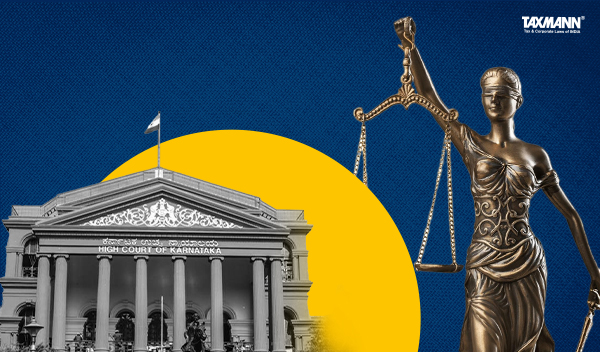Appeal Filed u/s 377 Cr. P.C. Against Conviction Order Passed u/s 276B Lies in Sessions Court | Karnataka HC
- Blog|News|Income Tax|
- 3 Min Read
- By Taxmann
- |
- Last Updated on 19 September, 2024

Case Details: Income-tax Department vs. Jenious Clothing (P.) Ltd. - [2024] 166 taxmann.com 372 (Karnataka)
Judiciary and Counsel Details
- Shivashankar Amarannavar, J.
-
E.I. Sanmathi, Adv. for the Petitioner.
-
S. Annamalai, Adv. for the Respondent.
Facts of the Case
The Special Court for Economic Offences convicted the assessee accused of offences under section 276B, read with section 278B. The Department had filed the instant appeal under section 377 of Cr.P.C. against the sentence for its inadequacy.
The matter reached before the Karnataka High Court.
High Court Held
The Court held that the offences under Chapter XXII of the I.T. Act, 1961, are non-cognizable offences in view of section 279-A. As per the first schedule of Cr.P.C. classification of offence against other laws, if an offence is punishable by imprisonment for less than 3 years or with a fine only, it is classified as non-cognizable, bailable and triable by any Magistrate. As the offences stated in section 279-A are non-cognizable within the meaning of Cr.P.C., they are triable by a Magistrate.
Offences registered by or against elected representatives are now tried by Special Courts established, and it is presided over by a Sessions Judge. That Special Court presided over by a Sessions Judge can be said to come under clause (b) – `any other Court’. The Special Court for economic offences, Bangalore, is presided over by an officer of the rank of Magistrate and does not come under clause (b) – `any other Court’. The appeal against convictions for the offence under Chapter XXII of I.T. Act, 1961 lies to the Sessions Judge under section 374 of Cr.P.C.
It was submitted that the assessee-accused had challenged the judgment of conviction passed by the Special Court, and the said criminal appeal is pending before the Sessions Court. If the appeal has been tried against the judgment of conviction by the Sessions Court and if the High Court deals with the appeal against the inadequacy of the sentence, it may lead to the passing of conflicting judgments.
In case of an appeal against conviction, if the Sessions Court reverses the judgment of conviction and acquits the accused and the High Court allows the appeal filed against the inadequacy of sentence, then the decisions are conflicting against the same judgment of conviction passed by the Special Court. To avoid such conflicting judgments, the appeal against conviction and appeal against inadequacy of the sentence are to be dealt with by the same Court.
Further, it was argued that in an appeal filed against the sentence on the ground of inadequacy under section 377 of Cr.P.C., the accused may plead for his acquittal or for reduction of sentence as provided under sub-section (3) of section 377 of Cr.P.C. The right of appeal is provided to the accused to challenge the judgment of conviction and order on sentence under sub-section (3) of section 374 of Cr.P.C. So also sub-section (3) of section 377 of Cr.P.C. provides for the accused to plead for his acquittal or reduction of sentence.
The accused who has been convicted need not wait till the State files an appeal under section 377 of Cr.P.C. to plead for his acquittal or for reduction of sentence. The accused has a statutory right under sub-section (3) of section 374 of Cr.P.C. to challenge the judgment of conviction and order on sentence passed by the Special Court. If the accused has not challenged the judgment of conviction and order on sentence by filing an appeal under sub-section (3) of Section 374 of Cr.P.C., then in the appeal filed under Section 377 of Cr.P.C., he can plead for his acquittal or reduction of sentence under sub-section (3) of section 377 of Cr.P.C.
Accordingly, the appeals preferred by the Income Tax Department under section 377 of Cr.P.C. were not maintainable and accordingly, all the appeals were dismissed.
Disclaimer: The content/information published on the website is only for general information of the user and shall not be construed as legal advice. While the Taxmann has exercised reasonable efforts to ensure the veracity of information/content published, Taxmann shall be under no liability in any manner whatsoever for incorrect information, if any.

Taxmann Publications has a dedicated in-house Research & Editorial Team. This team consists of a team of Chartered Accountants, Company Secretaries, and Lawyers. This team works under the guidance and supervision of editor-in-chief Mr Rakesh Bhargava.
The Research and Editorial Team is responsible for developing reliable and accurate content for the readers. The team follows the six-sigma approach to achieve the benchmark of zero error in its publications and research platforms. The team ensures that the following publication guidelines are thoroughly followed while developing the content:
- The statutory material is obtained only from the authorized and reliable sources
- All the latest developments in the judicial and legislative fields are covered
- Prepare the analytical write-ups on current, controversial, and important issues to help the readers to understand the concept and its implications
- Every content published by Taxmann is complete, accurate and lucid
- All evidence-based statements are supported with proper reference to Section, Circular No., Notification No. or citations
- The golden rules of grammar, style and consistency are thoroughly followed
- Font and size that’s easy to read and remain consistent across all imprint and digital publications are applied



 CA | CS | CMA
CA | CS | CMA
